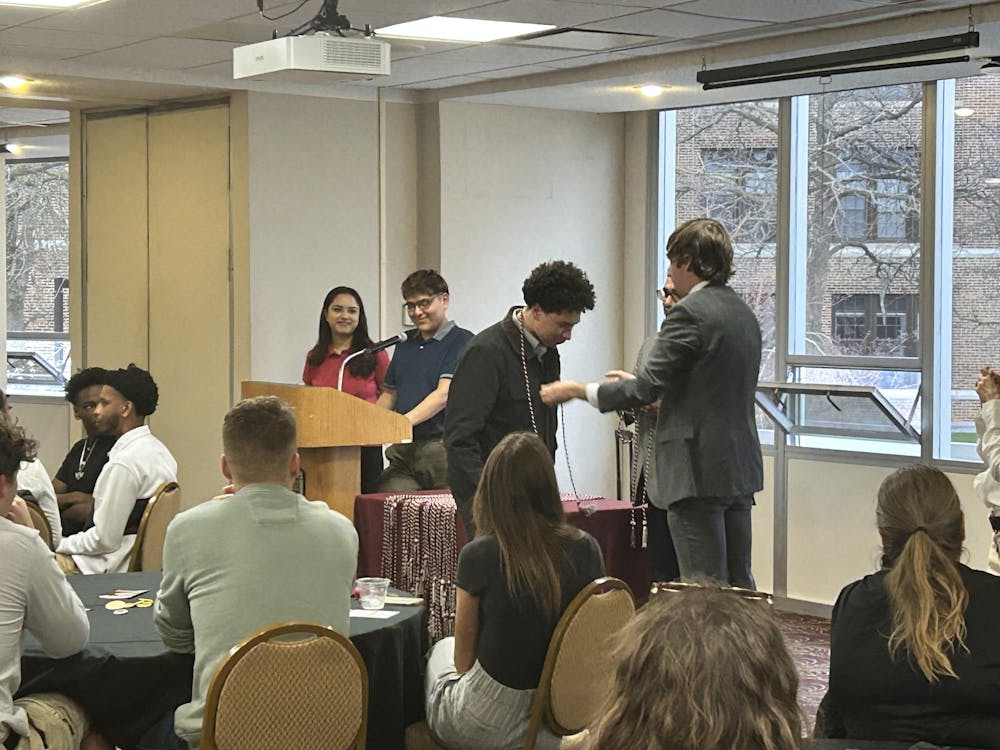'Don't be humble'
First Gen Central hosts cording ceremony

Christopher Herrera (middle) receives his first-generation cord for graduation in the UC Terrace rooms on April 22. (CM Life | Corey Hogue)
Rows of round tables occupied Terrace Rooms in the Bovee University Center, filled to bursting with family and supporters. The enthusiastic crowd sat among the entire purpose of the event: soon-to-graduating students.
“We could not be happier for you,” Paula Lancaster, provost and executive vice president of Central Michigan University, said. “You are really feeling that pride in yourself for all that you have accomplished. Right now, you deserve it. Don’t be humble at this point in time."
Each student came forward and received a cord made of metal balls and cloth, alternating between sliver and maroon, to wear at graduation.
Amy McGinnis, director of Student Experience in the Student Engagement and Professional Development HUB of CMU's College of Business, elaborated on the symbolism of the colors, before the graduates were called up.
McGinnis said the sliver represents hope and the determination to break barriers, and the maroon stands for passion growth and commitment to new opportunity and perceptiveness.
Christopher Herrera, a senior and first-gen student majoring in product design and engineering is graduating in May. He explained some of the difficulties that he endured that could be applied to many students coming to college, whose parents did not.
“I didn’t have any guidance,” Herrera said. “One of the biggest challenges of being a first-generation student would be just having to figure it out (on your own).”
Joleena Milam, a senior majoring in business administration, flanked by her mother and uncle, echoed some of those experiences. She gave special credit to the HUB's McGinnis, for acting as a highly valued support system.
That lack of prior knowledge upon entering college, and of the overall college experience can be overwhelming and isolating. This was a point Lancaster, herself a first-generation student, briefly revisited as students sat, ready to be called on.
“Most of what I knew about college came from friends that I had who were older than me ... and the teachers who really encouraged me to go," Lancaster said.
She said her parents “never stepped foot on a four-year campus” before she took the plunge herself.
“I still remember feeling pretty overwhelmed, being absolutely certain that everyone else on campus knew exactly what they were doing," she said. “Being worried that because I went to (a) small school, I would not be academically ready.”
Herrera said he overcame his own challenges by gaining self-confidence, learning how to ask for help and remembering his family's impact on him.
Particularly, he said his department, with small class sizes and only two or three of the same professors throughout, allowed him a good opportunity to learn.
“I had to learn how to be (a) social butterfly almost,” Herrea said. “Make connections and network with people, and through that I’ve made invaluable connections and friends at Central.”
Herrera said that graduating meant creating a new pathway for himself.
“It’s a way that I can develop a path for future generations (of) first-generation college students.” Herrera said. “Give them hope, that even with something like being first-gen and not knowing everything that goes with college, to persevere.
“Don’t put yourself in the bubble of what you can or can’t do.”
Milam, who is planning to start her own business and possibly continue on to graduate school, had a shorter but equally powerful message to first-gen students: “Stick with it.”






